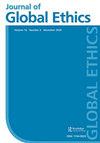Towards an action-guiding theory of human rights
Q2 Arts and Humanities
引用次数: 0
Abstract
ABSTRACT What are the main conditions that any theory of human rights should satisfy to guide action? If agents must take action for a fairer world as human rights discourse suggests, this is a crucial question to reflect upon. In this paper, I make a proposal. I argue that any theory of (moral) human rights that guides action on the basis of correlative duties must satisfy three key conditions. The first condition is focused on the specification of act-types, the second concerns the distribution of correlative duties, and the third is focused on the resolution of (resolvable) conflicts of human rights. I show that this proposal has substantive implications because it implies to reject, challenge and, in some cases, resist ideas that are commonly accepted in the literature on human rights.走向人权行动指导理论
任何指导行动的人权理论都应满足哪些主要条件?如果执法人员必须像人权话语所暗示的那样为一个更公平的世界采取行动,这是一个需要反思的关键问题。在本文中,我提出了一个建议。我认为,任何以相关义务为基础指导行动的(道德)人权理论都必须满足三个关键条件。第一个条件侧重于行为类型的规范,第二个条件侧重于相关义务的分配,第三个条件侧重于(可解决的)人权冲突的解决。我指出,这项建议具有实质性的影响,因为它意味着拒绝、挑战和在某些情况下抵制人权文献中普遍接受的想法。
本文章由计算机程序翻译,如有差异,请以英文原文为准。
求助全文
约1分钟内获得全文
求助全文

 求助内容:
求助内容: 应助结果提醒方式:
应助结果提醒方式:


